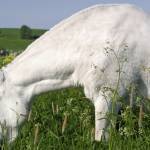New Hope for Ageing Broodmares: Omega-3 Fatty Acids

For an ageing broodmare, fading fertility can spell the end of motherhood. A hiccup in mitochondrial function, which supplies energy to oocytes and early embryos, may be one reason why infertility descends upon older mares.
With this in mind, researchers set out to determine if a diet high in omega-3 fatty acids and antioxidants influenced oocyte mitochondria number and function.* Ten mares between the ages of 13 and 23 years old were used in the study and fed a diet of grass/alfalfa hay. Some mares were supplemented with grain and corn oil, while others were supplemented with grain and an oil high in omega-3s and antioxidants.
Mares were followed closely for follicular development. When follicles were at least 35 mm, oocytes were collected by aspiration and incubated in medium. Mitochondrial function of the oocytes was evaluated, as were mitochondrial numbers. Some of the oocytes were then injected with frozen-thawed sperm, after which cleavage and blastocyst development were assessed. Cleavage can be defined as a series of divisions that transform the one-cell embryo into a structure containing multiple cells called blastomeres; a blastocyst develops as cell division continues and a small, fluid-filled cavity begins to form in the center of the embryo.
The mares fed a diet supplemented with omega-3 fatty acids and antioxidants had improved oocyte metabolic function and embryo development, when compared to diets supplemented with corn oil.
In sum, the researchers noted that the test diet “altered oocyte mitochondrial number and function, as well as potential for development into a blastocyte, indicating that it is capable of affecting the oocytes’ quality and developmental capacity.”
How can owners increase a mare’s consumption of omega-3 fatty acids and antioxidants? A rich source of omega-3s is fish oil, which contains two of the most important fatty acids: docosahexaenoic acid (DHA) and eicosapentaenoic acid (EPA). When comparing plant-based (flaxseed) and marine-derived (fish oil) sources of omega-3s, consider that marine-derived sources are more efficiently used by the horse. Choose a research-proven fish oil from a reputable manufacturer.
Antioxidants are substances that can prevent or slow damage to cells caused by free radicals, unstable molecules that the body produces as a reaction to normal body processes. In a crowded field of potential antioxidants for horses, vitamin E stands out. Multiple studies have underscored the importance of selecting a specific vitamin E product for optimal bioavailability: a natural, water-soluble, micellized product.
In and of itself, age does not always preclude a mare from producing viable oocytes, especially for use in specialized breeding programs, like embryo transfer. When strategically supplemented with key nutrients, older mares might regain the importance they once had in broodmare bands, allowing breeders to preserve important bloodlines.
*Catandi, C., Y. Obeidat, J. Stokes, A. Chicco, T. Chen, and E. Carnevale. 2020. Maternal diet can alter oocyte mitochondrial number and function. Journal of Equine Veterinary Science 89 (Abstract).








